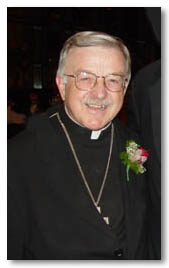The Price of Easy Money
- FATHER RAYMOND J. DE SOUZA
The good news for hockey fans in Pittsburgh came last week not from the hockey team, but from the Pittsburgh Gaming Task Force.
 |
|
Bishop Fred Henry
|
The Penguins play in the oldest arena in the NHL and without a new arena, the team’s future in Pittsburgh is in doubt. Yet nobody has the money for a new arena. Enter casino operator Isle of Capri, which is bidding for a casino license to be awarded at the end of the year. Isle of Capri has said it will pay US$290-million toward a new hockey arena if it gets a slot machine license. Last week, the Gaming Task Force praised the plan, saying it is the strongest of the bids so far, raising hopes that Isle of Capri will win the license and the gambling profits will save the Penguins.
It has come to this, to this humiliation. Our game is now dependent on gaming. But then so much does. It’s the future.
Gambling — always considered to be a slightly dodgy if not, strictly speaking, immoral recreation — has purchased new credibility in the public eye. And it has purchased it the old fashioned way, with cold, hard cash.
Need to redevelop a depressed part of town? Build a casino — as is part of the Isle of Capri plan for Pittsburgh. Worried about a declining industrial sector? Build a casino — as they did on both sides of the Detroit River, with Detroit and Windsor competing for gamblers as they once did for car plants. Concerned about the continuing plight of native Canadians or Americans? Build a casino — Indian reserves are highly desirable places for gambling, no doubt making a contribution to the preservation of traditional tribal cultures. Eager to establish a new international tourist destination? Build casinos by the dozen — as they are doing in Macau, with the former Portuguese colony set to overtake Las Vegas this year in overall gambling revenues. Or need some new MRI machines in our strapped health care system? Provincial governments in Canada took in $7.3-billion last year in profits from lotteries, videolottery terminals and casinos, a figure that has grown 79% since 1992.
There is hardly a cause which does not seek to feed at the gambling trough. Parents raising money for sports teams, schools wishing to support the drama program, charities looking for new revenues — everyone is down at the local casino, taking their cut of the revenues thrown off by the apparently insatiable appetite for gambling.
Easy money never comes without a cost; somebody has to pay. The casino doesn’t care who it is; our governments and our charities should. |
Gambling per se is not immoral and, in moderation, is a legitimate form of recreation. At the same time, it is well known that widespread gambling puts temptation in front of those who will fritter away the rent money, and disproportionately draws upon the already limited resources of the poor. There is something ignoble about using it as an all-purpose means of fundraising, and as a replacement for revenues previously provided by taxation or charitable giving.
Yet there are few who oppose the trend. Bishop Frederick Henry of Calgary is one, having decreed some years back that his parishes would no longer use gambling for fundraising. He asked the same of the Catholic schools, and last spring the school board formally refused, saying in essence that the Catholic bishop was in no position to make moral decisions for the Catholic schools. But Bishop Henry is not one for bluffing, and promised sanctions against the schools if they did not give up their gambling habit. Last month, the Catholic school board reluctantly complied.
It was illustrative of how deeply entrenched the gambling mentality is. The Calgary Catholic schools took in some $2-million in fundraising from gambling, a pittance given an annual budget of several hundred million. The provincial surplus in Alberta runs to the billions of dollars. It is implausible that Calgary’s schools needed to resort to gambling revenues. They did so because it is easy.
The prospect of easy money draws the gambler to the casino. But public policy should resist the temptation of easy money. There are other ways to raise money that are harder — taxation, donation — and they should be, for they involve a level of accountability and fairness that gambling does not.
Easy money never comes without a cost; somebody has to pay. The casino doesn’t care who it is; our governments and our charities should.
![]()
 This is Meaghen Gonzalez, Editor of CERC. I hope you appreciated this piece. We curate these articles especially for believers like you.
This is Meaghen Gonzalez, Editor of CERC. I hope you appreciated this piece. We curate these articles especially for believers like you.
Please show your appreciation by making a $3 donation. CERC is entirely reader supported.

Acknowledgement
Father Raymond J. de Souza, "The price of easy money." National Post, (Canada) October 26, 2006.
Reprinted with permission of the National Post and Fr. de Souza.
The Author
Father Raymond J. de Souza is the founding editor of Convivium magazine.
Copyright © 2006 National Post

